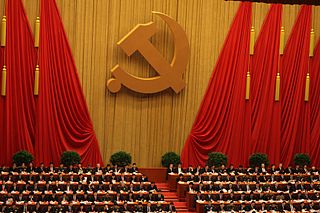Related Research Articles

The Standing Committee of the Central Political Bureau of the Communist Party of China, usually known as the Politburo Standing Committee (PSC), is a committee consisting of the top leadership of the Communist Party of China. Historically it has been composed of five to eleven members, and currently has seven members. Its officially mandated purpose is to conduct policy discussions and make decisions on major issues when the Politburo, a larger decision-making body, is not in session. According to the party's Constitution, the General Secretary of the Central Committee must also be a member of the Politburo Standing Committee.
The Orders of precedence in China is the ranking of political leaders in China for the purposes of event protocol and to arrange the ordering of names in official news bulletins, both written and televised. It is also sometimes used to assess perceived level of political power. Although there is no formally published ranking, there is usually an established convention and protocol, and the relative positions of Chinese political figures can usually be deduced from the order in meetings and especially by the time and order in which figures are covered by the official media.
Zeng Qinghong is a retired Chinese politician. He was a member of the Politburo Standing Committee of the Communist Party of China, China's highest leadership council, and top-ranked member of the Secretariat of the Central Committee between 2002 and 2007. He also served as the Vice-President of the People's Republic of China from 2003 to 2008.

The Central Secretariat of the Communist Party of China is a body serving the Politburo of the Communist Party of China and its Standing Committee. The secretariat is mainly responsible for carrying out routine operations of the Politburo and the coordination of organizations and stakeholders to achieve tasks as set out by the Politburo. It is empowered by the Politburo to make routine day-to-day decisions on issues of concern in accordance to the decisions of the Politburo, but it must consult the Politburo on substantive matters.
Wu Guanzheng is a former Chinese politician and one of the major leaders of the Communist Party of China during the administration of Hu Jintao. He served on the Politburo Standing Committee, the country's top ruling body, from 2002 to 2007. During that time he also served as the Secretary of the Central Commission for Discipline Inspection of the Communist Party of China, the party's anti-graft body. He had a lengthy political career, having served as mayor of Wuhan, Governor then Party Secretary of Jiangxi, then party chief of Shandong. Wu retired in 2007 and left public life.
The Shanghai clique is the name given to an informal group of officials in the Communist Party of China, especially those who serve in the Central Committee or the Central Government of China, who rose to prominence in connection to the Shanghai municipal administration under Jiang Zemin, former General Secretary of the Communist Party of China.
The 16th National Congress of the Communist Party of China was held in Beijing between November 8th and 14th, 2002. 2,114 delegates and 40 specially invited delegates elected a 356-member 16th CPC Central Committee, as well as a 121-member Central Commission for Discipline Inspection (CCDI). The Congress marked the nominal transition of power between Jiang Zemin and Hu Jintao, who replaced Jiang as General Secretary, and a newly expanded Politburo Standing Committee line-up. The institutional transition would be completed in state organs by the 2003 National People's Congress in March. Jiang, however, remained head of the Central Military Commission, therefore in practice, the power transition was not complete.
The 17th National Congress of the Communist Party of China was held in Beijing, China, at the Great Hall of the People from 15 to 21 October 2007. The Congress marked significant shift in the political direction of the country as CPC General Secretary Hu Jintao solidified his position of leadership. Hu's signature policy doctrine, the Scientific Development Concept, which aimed to create a "Socialist Harmonious Society" through egalitarian wealth distribution and concern for the country's less well-off, was enshrined into the Party Constitution.
The 14th Politburo of the Communist Party of China was elected by the 14th Central Committee of the Communist Party of China on October 19, 1992. It was preceded by the 13th Politburo of the Communist Party of China. It served until 1997.
The 15th Central Committee of the Communist Party of China was in session from 1997 to 2002. The 14th Central Committee preceded it. The China Democracy Party formed in this period, and was suppressed. It held seven plenary sessions. It was followed by the 16th Central Committee of the Communist Party of China.
The 14th Central Committee of the Communist Party of China was in session from 1992 to 1997. It held seven plenary sessions. It was preceded by the 13th Central Committee. It was most certainly succeeded by the 15th Central Committee of the Communist Party of China.

The 18th National Congress of the Communist Party of China began on November 8, 2012 at the Great Hall of the People. Due to term and age limits restrictions, seven of the nine members of the powerful Politburo Standing Committee (PSC) retired during the Congress, including Hu Jintao, who was replaced by Xi Jinping as General Secretary of the Communist Party of China. The Congress elected the 18th Central Committee of the Communist Party of China, and saw the number of Politburo Standing Committee seats reduced from nine to seven.
Events in the year 2006 in China.
Events in the year 2005 in China.
Events in the year 2004 in China.
Events in the year 2003 in China.
The 1st Session of the 10th National People's Congress was held from March 5 to March 18 in Beijing, China, in conjunction with the 2003 session of the Chinese People's Political Consultative Conference.